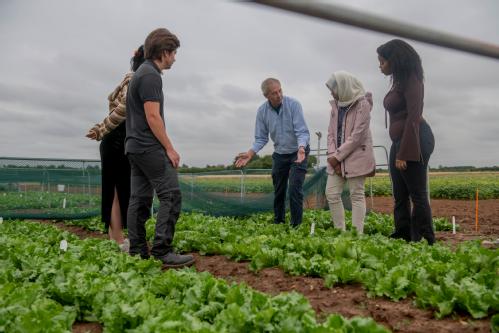National Organic Month: The University of Warwick's pioneering research into low-input farming from the crop centre
During National Organic Month, the University of Warwick's Crop Centre takes a pioneering stance in the realm of low-input farming, shedding light on the concept of 'organic farming.'
At the forefront of this ongoing research, a Warwick researcher is investigating the potential benefits and principles of low-input farming.

Low-input farming is a crop-growing process which uses as little manufactured resources as possible, these include chemical fertilisers, pesticides and energy. Instead, low-input farming relies on biological systems to feed growing crops and prevent pests and diseases.
Professor Rosemary Collier, an expert in food production and the natural environment, elaborates on the nuances of 'organic' as an intensified variant of low-input farming.
She said "In this approach, products are cultivated and processed without the use of synthetic chemicals, pesticides, herbicides, and select artificial additives or preservatives.
"The rationale behind choosing organic food varies, and there exists substantial scientific evidence showcasing its positive impact on biodiversity due to its distinctive cultivation methods."
The benefits of organic food are accompanied by higher costs, stemming from the management of fertility, pests, and diseases through non-synthetic means.
These methodologies often prove more intricate and time-consuming, potentially leading to increased waste and crops that don't always adhere to higher standards. Meanwhile, the ongoing conflict in Ukraine continues to trigger fluctuations in fertilizer costs, given the substantial natural gas requirements for production.
Professor Collier explains the need for enhanced efficiency in low-input farming, accentuated by the climate crisis and the evolving landscapes of fertilizer and chemical production.
"The focus of the Crop Centre's endeavours at the University of Warwick revolves around shaping the future of low-input farming.
"This direction primarily arises from environmental concerns and mounting evidence indicating that the use of synthetic chemicals contributes to pollution and harms biodiversity."
At the University, a post-graduate module titled 'Organic and other low input farming systems' equips students to explore diverse approaches to low-input production. This includes emerging methodologies like agroforestry, involving the integration of tree cultivation into cropping strategies.
Additionally, the research delves into the realm of plant breeding and genetic enhancement to diminish the reliance on chemical inputs. This entails the study of crop genes that facilitate more efficient nutrient utilization, along with those conferring heightened resistance to pests and diseases.






